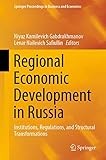Regional Economic Development in Russia [electronic resource] : Institutions, Regulations, and Structural Transformations / edited by Niyaz Kamilevich Gabdrakhmanov, Lenar Nailevich Safiullin.
Material type: TextSeries: Springer Proceedings in Business and EconomicsPublisher: Cham : Springer International Publishing : Imprint: Springer, 2020Edition: 1st ed. 2020Description: XI, 285 p. 46 illus., 35 illus. in color. online resourceContent type: text Media type: computer Carrier type: online resourceISBN: 9783030398590Subject(s): Regional economics | Spatial economics | Management | Public administration | Banks and banking | Regional/Spatial Science | Management | Public Administration | BankingAdditional physical formats: Printed edition:: No title; Printed edition:: No title; Printed edition:: No titleDDC classification: 338.9 LOC classification: HT388HD28-9999Online resources: Click here to access online
TextSeries: Springer Proceedings in Business and EconomicsPublisher: Cham : Springer International Publishing : Imprint: Springer, 2020Edition: 1st ed. 2020Description: XI, 285 p. 46 illus., 35 illus. in color. online resourceContent type: text Media type: computer Carrier type: online resourceISBN: 9783030398590Subject(s): Regional economics | Spatial economics | Management | Public administration | Banks and banking | Regional/Spatial Science | Management | Public Administration | BankingAdditional physical formats: Printed edition:: No title; Printed edition:: No title; Printed edition:: No titleDDC classification: 338.9 LOC classification: HT388HD28-9999Online resources: Click here to access online Part I. Regional Economic Development -- Part II. Problems of contemporary regional policy.-Part III. Structural Changes in the Regional Economy -- Conclusions.
This book gathers selected papers presented at the International Scientific Conference “Economics in the Changing World,” held on June 26-27, 2018 at the Institute of Management, Economics and Finance of Kazan Federal University (Kazan, Russia). The conference featured contributions by leading specialists in the field of management, territorial development, and state, regional and municipal management, covering the modern trends in the development of economic complexes and firms, economics of innovative processes, social policy, financial analysis, and mathematical methods in economic research. The book highlights new approaches for the development of various sectors of the Russian economy and individual markets, as well as for the efficiency of entrepreneurship in general. It also analyzes the concept, meaning and directions of the socio-economic development of the regional subjects in the Russian Federation. The scientific studies included make a significant contribution to the development of entrepreneurship, regional management, rationalization and optimization of resource use, state territorial administration, and sustainable economic growth in the regions and the transport infrastructure.
